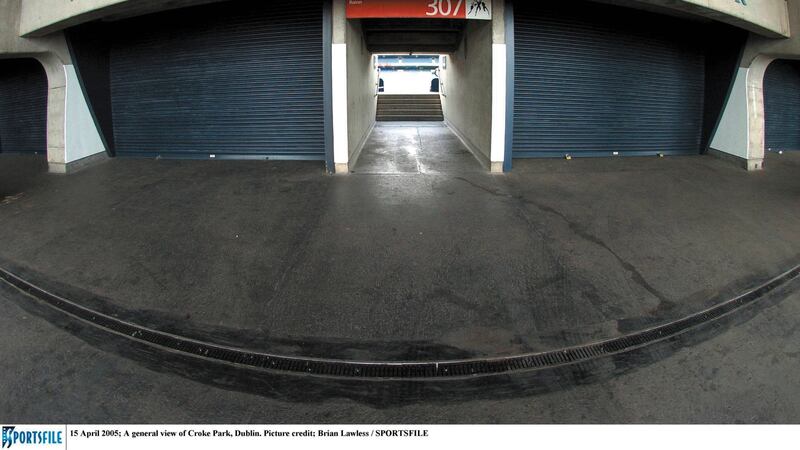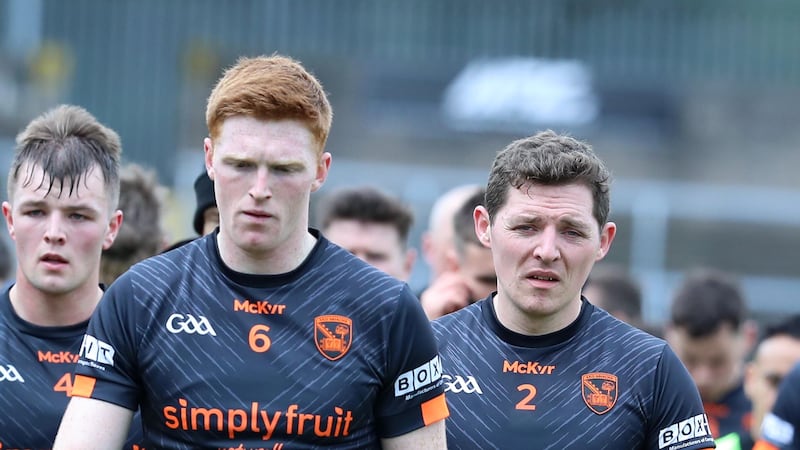THE first time I met Joe Brolly he didn’t say ‘Hello’; instead, he offered a typically forthright opinion (albeit based on guesswork), commenting: “You’re not as tall as I thought you were.”
Some might have taken offence at that but I merely laughed, replying along the lines that I’d been that height for quite a number of years. That’s Joe.
He speaks his mind, whatever’s on his mind at the time, and he doesn’t appear to care if he might hurt some feelings. His honesty is admirable, if not his tact.
I’m going to follow Joe’s example this week, even though I may offend the vast majority of the GAA’s membership, perhaps all the players. I often disagree with Joe’s opinions, although I wouldn’t necessarily argue with him as I’d probably lose.
Joe’s newspaper column last Sunday was superb, however, railing against the self-help and self-improvement industries. I agreed with almost every word of it.
Yet, the GAA can help itself, can improve itself - ironically, though, only by applying the searing honesty that Joe Brolly often deploys. The GAA is like traffic, in this respect; when you’re sitting in a tailback on the M1 or M2 or wherever, don’t go thinking ‘Blooming traffic’ - you are the traffic.
Similarly, don’t go blaming ‘Croke Park’ for the ills of the GAA - you are the GAA. The idea that more than 98 per cent of players (the club men and women) can be ground down and misused by less than two per cent (the inter-county elite) is ridiculous. The vast majority are colluding in their own oppression.
For all the sneering, the GAA is democratic. Clubs vote in their own officers/ county delegates. County delegates make decisions that affect the club and the county - including fixture scheduling.
So, as I’ve written before, vote in officials who reflect your opinions. Send them to county convention with a clear mandate to achieve the changes you want for the GAA.
Make sure that central council delegates reflect the needs of the entire county, including its clubs, not just the county team(s). Don’t just send them off to vote whatever way they think themselves. That’s a whole different version of ‘one person, one vote’.
Yet, while I’m calling on club members to act differently, inter-county players need to be honest too. Stop professing your love for your club but then showing it no love - or no interest or involvement - whatsoever.
Don’t come to the end of your inter-county career and then express surprise and disappointment about how badly club players are treated. Your friends still play with your club, whenever they are afforded the opportunities, so surely they will let you know what is going on (If you’re one of those inter-county players who is still heavily involved with your club then you know this doesn’t apply to you).
Whilst agreeing with Joe Brolly that there is so much BS propounded about ‘the power of the mind’, the GAA can change for the better with a change of mindset.
Funnily enough, much of the damage being done is physical rather than mental. There simply has to be a reduction in the ludicrously high training-to-games ratio that has increasingly afflicted the GAA.
The association is largely supposed to be about playing games. Not training and training and training and then maybe getting a few minutes off the bench - or no playing time at all.
Training and the travelling to and from it account for the vast bulk of the time, money, and effort expended in the GAA, and much of it is needless.
Players need to stand up and say ‘No’. ‘No, we’re fit enough. Let us play practice games at least. Let us play.’ Players of a certain age, being pulled between various teams, need to be able to say ‘No, I’m not training with you because I’m playing or training with X tonight’.
Such sensible attitudes need to be respected and supported by the majority - not a silent majority but one that speaks up rather than muttering and moaning in the background. If managers are pig-headed enough to drop good players because they won’t train five times a week then it’s their loss, and the county’s loss.
Perhaps counties could go back to a system of selectors so that the best players are picked, without bias or bitterness being involved (or not too much anyway) but tackling the power of county managers is no easy task. Players also have to make their choice: stand up (for themselves) or shut up. Respect their own bodies and their own lives.
The nascent Club Players’ Association intends to work with the GAA and that has to be the approach. Indeed, what’s needed is one players’ association embracing all.
The divide between ‘club’ and ‘county’ players is a false construct. County players are club players. And almost all club players want to be county players.
At the risk of sounding a little hippy-dippy - sorry, Joe - it should not be about two sides complaining about each other but about everyone travelling along the same road together.
Club members should be rightly proud of their club-mates who go on to represent the county, rather than resenting them for ‘ruining the club scene’.
I agree with my colleague Cahair O’Kane that there are plenty of positives in GAA director-general Páraic Duffy’s proposals for restructuring of the provincial and All-Ireland Senior Football Championship.
Realistically, the vast majority of counties will know that their involvement in the All-Ireland will be over by the end of July even under the current system.
There will be a few trying to keep up with the regular participants at Jones’ Road - Dublin, Kerry, Mayo, Donegal and Tyrone - but most counties should be able to plan for the club scene from August onwards, and earlier under the new proposals.
Yet, agreeing to a round robin of group games involving the top eight teams each year, replacing the All-Ireland quarter-finals, would undo a lot of the good work planned to create room for club action in the calendar.
If the club truly does matter more to most people than their county, then show it. This isn’t about ‘the power of the positive thinking’. It’s long overdue for club members to take positive action, get off their knees and make their voices heard.
As Joe Brolly might have asked me: ‘Are you really standing up?’









